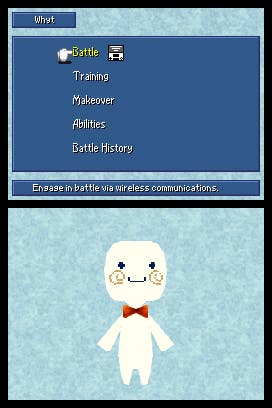Final Fantasy IV
Chocobo selector.
Players 'spoiled' by modern day gaming's indulgences may find the challenge too much to bear, but approached with the right mind-set, it can make for very rewarding play. Every encounter, from a lowly bat up through to a hulking Antilon boss is defined by difficulty, and as such the importance of items and their careful management is pushed to the fore. Whereas in most RPGs, health- and magic-restoring potions and ethers soon become redundant, here they are precious commodities to be treasured and used sparingly throughout. Every excursion from the safety of a town's borders is heavy with danger, bringing the game's economy into sharp focus.
This new emphasis is intensified by some new mechanics to the update. For example, whenever you enter a cave or dungeon, the bottom screen switches to a blank canvas. Then, as you explore, lines are drawn onto the screen mapping out the area. Complete a map of the dungeon to 100 per cent and you'll be richly rewarded with new items or money. It's a brilliant idea introducing a neat risk/reward mechanic: should you race through a dungeon, limiting the number of fights your team will encounter but miss treasure chests and lose your map completion bonus or should you painstakingly cover every inch or ground and reap the full benefits?
In contrast to Final Fantasy III, characters are given set classes with unique abilities. To introduce flexibility to the system, Matrix has added the ability to customise characters within their classes with new abilities known as 'Augments'. These can be found throughout the world as items, or stolen from certain enemies and even 'inherited' from characters that join the party for a short period of time before leaving as the plot dictates. With some experimentation it's possible to create some interesting and powerful combinations and this flexibility within the hitherto strict character classes is a welcome success.

There are some petty irritations such as the lack of cursor memory (if you want to keep entering the same attacks during each round of a battle you'll have to manually input them every turn). Likewise, you can't hold down a directional input to scroll through a menu list, rather you have to tap up and down for each and every item in the list; stupid, unnecessary oversights that niggle away. The encounter rate throughout is high and the fact that you can only save on the world map or at designated spots inside dungeons makes the game unsuitable for short-term, on-the-move play.
It's not the best Final fantasy game in the series - even with the new additions to what was already a strong classic JRPG, the inescapable confines of the structure make this literally a lesser game than many of the subsequent releases - but it's a respectful and assured update and that freshens an aged experience for a modern audience. Of course, for those who have made up their minds with regard to the Final Fantasy brand there will be nothing here to convince them that the game is anything other than universally brilliant or universally terrible. But for those who deal in more than mere absolutes, this is a project of mixed excellence that bodes well for the inevitable updates of Final Fantasy V and beyond.

